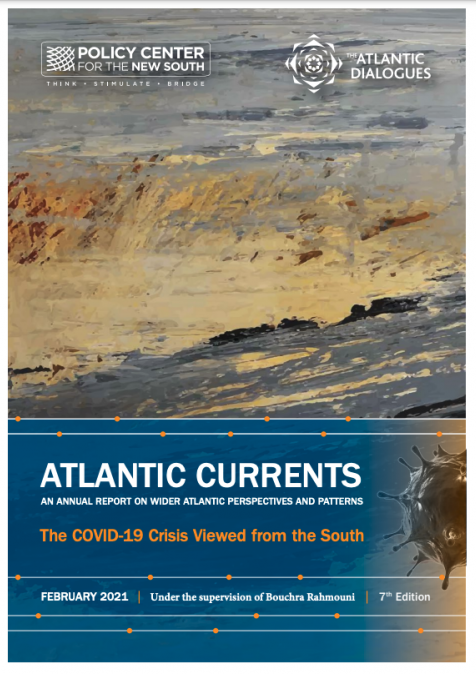Publications /
Opinion
Francisco Cordoba is a 2019 alumnus of Atlantic Dialogues Emerging Leaders program. Learn more about him here.
This piece was originally published here.
I recently had an eye-opening experience at the Atlantic Dialogue conference in Morocco, organized by the Policy Center for the New South. Picture this: a diverse gathering of leaders, policymakers, and innovators from across Africa and the Atlantic basin. It was like a mini melting pot of ideas and cultures.
One intriguing conversation I had stands out. It was with a Nigerian diplomat. We got talking about Artificial intelligence, and he asked why people seem so spooked by it. I couldn't help but think of Hollywood’s portrayal of AI—you know, the whole Terminator scenario or the last Mission Impossible movie in which AI goes rogue and takes over the world. It’s no wonder people are hesitant to even dip their toes into AI waters.
But here's the catch: AI, especially generative AI, is an unstoppable force, kind of like a tsunami. Countries have two options: either stand still and get overwhelmed or build submarines to navigate and harness this immense power. The same power shift we saw with smartphones is happening right now with AI. I emphasized to the diplomat that relying solely on AI giants from the U.S., China, or Europe is a strategic blunder. ChatGPT, for example, primarily trained in English, can translate to Yoruba, but it lacks an understanding of local nuance, which is crucial.
If countries just wait passively, their people will end up depending on foreign AI services. But if a country like Nigeria develops its own version of ChatGPT, it could revolutionize the nation. The process? Start with open-source Large Language Models (LLMs), such as Mistral from France or Falcon from the UAE. Train them with local data in various languages. This way, you’re creating a new model that grasps the unique cultural fabric of each country.
Then, make this model open source, so local universities, businesses, and governments can leverage it. Imagine the government investing in computer chips for training the model, and then institutions using and improving it collaboratively.
This localized LLM could surpass ChatGPT in relevance and open up a world of opportunities for the people of the country. This strategy is not just for Nigeria but for Colombia and every nation seeking AI independence.
So, those were my two cents at the conference in December 2023. Being there as an ADEL conference alumnus was a real privilege. Imagine the impact if each country could harness AI tailored to its cultural and linguistic intricacies. The possibilities are limitless!
What do you think? Could this be the way forward for countries to not just ride the AI wave but steer it in the way they want it to go?
The Atlantic Identity: Uniting Through Generative AI
At the heart of the vibrant Atlantic Dialogue conference in Morocco, a panel boldly tackled the concept of the ‘Atlantic Identity’. The intriguing consensus? There isn't such an identity—a reflection of the diverse tapestry of cultures, economies, and languages that surround the Atlantic Ocean. Yet, it's in this diversity that I see an untapped opportunity, particularly through the lens of generative AI (GenAI).
As we grapple with the idea of identity, it's important to recognize that our differences are not just barriers but bridges. GenAI offers a groundbreaking way to connect these bridges. Imagine if every Atlantic nation began to share its experiences and lessons learned from implementing its local LLM. This could usher in a new era of technological cooperation, transcending traditional boundaries.
For instance, small and medium-sized enterprises (SMEs) are often the lifeblood of economies but face barriers in adopting new technologies. Through shared GenAI knowledge and applications, these enterprises could experience transformational growth. Countries could exchange models and strategies tailored to SMEs, facilitating a smoother digital transition.
Education, another crucial area, stands to gain immensely. The implementation of LLMs could revolutionize the way we approach learning, teaching, and research. By sharing methodologies and tools adapted to local contexts, we can collectively uplift educational standards across the Atlantic region.
Foster Awintiti, a speaker at the conference, highlighted an essential point: the need for data analytics to enhance trade. He’s spot on. By leveraging GenAI in data analysis, nations can better understand and capitalize on trade opportunities. This isn’t just about improving existing trade. It’s about uncovering new pathways and possibilities that we haven’t even considered yet.
But it’s more than just economics and education. This is about creating a shared Atlantic narrative, one that is woven from the unique threads of each nation’s experiences. Through GenAI, we can build a collective repository of knowledge, insights, and innovations. This repository would become a beacon, guiding countries in navigating the complexities of the twenty-first century, while respecting and celebrating their unique cultural identities.
The potential for transformative impact is immense. By sharing GenAI implementations, we’re not just enhancing technological capabilities—we're facilitating a dialogue. This dialogue transcends linguistic and cultural barriers, fostering a sense of community and shared purpose. More than a billion lives stand to be positively impacted by this collaboration, marking a significant stride towards a unified Atlantic identity.
As I reflect on the discussions at the conference and the road ahead, I am filled with optimism. The Atlantic identity might currently be a tapestry made up of diverse threads, but through the shared vision and application of GenAI, we can weave these threads into a vibrant, unified tapestry. This is our opportunity to redefine not just what it means to be a part of the Atlantic community, but also how we leverage technology for the greater good of all its inhabitants. You can find more about the conference that inspired these ideas here.







